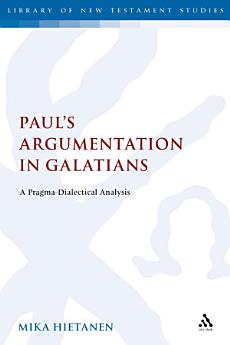Paul's Argumentation in Galatians: A Pragma-Dialectical Analysis
Mika Hietanen
Jul 2007 · The Library of New Testament Studies Book 344 · Bloomsbury Publishing
Ebook
232
Pages
reportRatings and reviews aren’t verified Learn More
About this ebook
Galatians is a polemical letter which contains a substantial amount of argumentative passages. Paul evidently wanted to persuade by using the best arguments possible to convince his addressees. Using a state-of-the-art method from the discipline of argumentation analysis, Paul's argumentation can be analysed with a precision that standard exegetical methods cannot provide. The pragma-dialectical method developed in Amsterdam facilitates an analysis which is both descriptive and normative. On the one hand, Paul's argumentation can be described, such as the relationship between premisses and conclusions, the structure of the arguments, and features relating to rhetorical strategy. On the other hand, the method makes it possible to evaluate Paul's argumentation against a set of rules for sound reasoning. Fallacies and problematic arguments can be described accurately. The spiritual nature of Paul's matters do not relieve him of rationality, and Paul himself does not argue as if it did.
Paul's argumentation is found problematic in several respects. There is a tension in the text: Paul works a great deal to argue his claims while at the same time giving the impression that he merely wants to declare his standpoints and does not want to carry out an argumentation at all. Many of the conclusions are presented as self-evident, even when they are not. Paul's style is far from an ideal model of the resolution of a dispute. Paul relies heavily on an argumentative strategy with maximal use of rhetorical devices. The analysis shows that a contemporary method of argumentation analysis provides tools necessary to adequately describe and understand both individual arguments and the overarching strategy of the argumentation in a Pauline text.
Paul's argumentation is found problematic in several respects. There is a tension in the text: Paul works a great deal to argue his claims while at the same time giving the impression that he merely wants to declare his standpoints and does not want to carry out an argumentation at all. Many of the conclusions are presented as self-evident, even when they are not. Paul's style is far from an ideal model of the resolution of a dispute. Paul relies heavily on an argumentative strategy with maximal use of rhetorical devices. The analysis shows that a contemporary method of argumentation analysis provides tools necessary to adequately describe and understand both individual arguments and the overarching strategy of the argumentation in a Pauline text.
About the author
Mika Hietanen is Doctor of Theology in New Testament exegesis, Åbo Akademi University, Finland.
Rate this ebook
Tell us what you think.
Reading information
Smartphones and tablets
Install the Google Play Books app for Android and iPad/iPhone. It syncs automatically with your account and allows you to read online or offline wherever you are.
Laptops and computers
You can listen to audiobooks purchased on Google Play using your computer's web browser.
eReaders and other devices
To read on e-ink devices like Kobo eReaders, you'll need to download a file and transfer it to your device. Follow the detailed Help Center instructions to transfer the files to supported eReaders.








